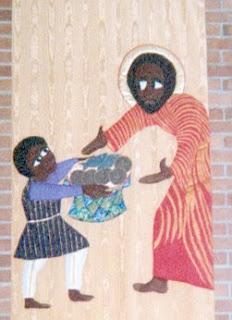Sometimes, driving home in the evening, I tune the radio to a religious talk show. I know, I need to get a bit more of a life. Maybe I’ll subscribe to Cirrius radio so I have more options. What I like about the show is that it’s one of those call-in varieties.
Judging either the quality of the questions or the motives of those asking them is not on my agenda. I’m impressed that there are people still seeking understanding, to deepen their faith.
I don’t judge the questions, but I can be very critical of the answers. It’s not so much that I disagree with this or that interpretation of scripture, or find myself disappointed by one or another explanation of doctrine. What saddens me is that the so-called experts offering the answers keep their responses way too shallow. They reply with quick and easy comebacks. Maybe they’re more interested in taking lots of calls than they are in launching deeper thinking.
Here’s an example. A young man called to say he’d been stumped by a charge made by a non-believing friend. The friend said he didn’t believe in God because if there were a God who cared enough about us to send his own son to live and become among us, in flesh and blood, this God would have sent that son at a more appropriate time in history. Why, the friend went on, would a powerful God, show up to such backward people, so long ago? Wouldn’t an intelligent God come at a time like ours, when bright people like us would recognize and appreciate God’s effort more than those unsophisticated folks back when? In sum, he asked, how could he argue his unbelieving friend’s premise?
Not bad. I’ve heard simpler questions. Here’s the answer the caller received. “It’s not our place to question the wisdom of God. If you believe God is for us, then you must also trust that God thought all that through, and we’ll just have to live with God’s good intentions.” It’s answers like that which prompt a friend of mine to pray, sometimes, this way, “Hey, God, why don’t you pick on somebody your own size?”
Let me offer a different answer, an answer we can see as clearly as a picture. You’ve seen Christmas cards displaying a nativity scene, right. There’s often a cave, or maybe a barn at the edge of town. Perhaps even a close-up of too many animals camped too near, too many guests, huddled around a couple, usually Caucasian, peering at a very chipper, pink, healthy-looking newborn lying in a feedbox. You get it.
We know in our heads and in our hearts that we’re not looking at a real-time snapshot. What we’re invited to see is a portrait that invites us inside, beckons us to find a place for ourselves within not only the frame, but also to experience ourselves, and each other, as included in this birth’s immense meaning.
But I want to offer even more than that. Think about what Luke says in chapter 1:2-14. There was a moment in time when a large, self-aggrandizing country, led by a self-absorbed leader. He capitalized on this people’s arrogance about their culture, their values, and their religion, the set a big, powerful army to most places in the known world, to subjugate the peoples in those other lands.
Moreover, these foreign invaders kept their death-dealing machine operating by enlisting the support of local goons, who got along by going along, and assisted in the ongoing, deepening oppression of their own brothers and sisters. They described the result as pax (peace).
Know who, and when, I’m talking about? Oh no you don’t. I could be talking about the Egyptians, the Assyrians, the Babylonians, the Ottoman Empire, Spain, Great Britain, China, Germany, Japan, certainly can’t forget ancient Rome, the region of Darfur, or the good ol’ USA.
In every time and place, people of every tribe and nation have found a way to deny, frustrate and denigrate God’s good design for creation and God’s loving-kindness for all God’s beloved creatures. And at one time, long ago, in a place not much different than our own here and now, God spoke to refute that evil by sounding a word so loud, so clear, it took flesh in Jesus, Emmanuel.
As, theologian Walter Brueggemann reminds us, God’s word is always a word abrasive to culture. So this word, Emmanuel, God-with-Us, speaks God’s ultimate language of our belonging and our becoming in the person of Jesus, messiah:
• Baby King in the face of killer Kings
• Wonderful Counselor against warrior combatants
• Mighty God in opposition to maniacal goons
• Everlasting Father as rival to evildoers
• Prince of Peace in contrast to every prince of darkness.
God for us all; born at the margins so as to leave none of us at the margins. God saving us all, before we make ourselves right, and prior to the time when we might, finally, make the world fair to all.
God’s life-giving, freedom bringing, home-making, word, to each of us, to all of us, is love. Love spoke then, love is speaking now, and love keeps echoing in our ears and reverberating in the beats of every heart, for all time, for every person, in every tribe and nation.
The picture Luke paints, the one artists never tire of redrawing and God’s people never weary of sending round the world, is nothing less than our own timeless, family portrait. Even when we’re too tired to claim it, too weary to see ourselves within its frame, God saves for each of us, in this new borning Jesus, both a worthy place in the picture, and an honored place in God’s own heart.
Blessed, blessed, Christmas!
Monday, December 25, 2006
Subscribe to:
Post Comments (Atom)




No comments:
Post a Comment